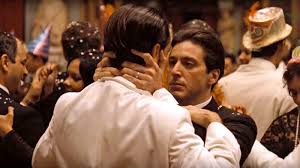The Godfather Part II

The success of early 1970s releases like “The Godfather” and “The Exorcist” demonstrated that when artists and studios collaborate effectively, combining creative vision with financial resource, they can create groundbreaking films that achieve both immense critical acclaim and extraordinary box office success. The peaks reached by filmmakers such as Francis Ford Coppola and William Friedkin would continue as the decade neared its mid-point, and arguably increase as innovative ideas along with targeted distribution and marketing brought audiences not only what they wanted, but also what they needed. And as Watergate consumed the public consciousness, comedy would prove to be a much-appreciated distraction.
Proving once again that great cinema can include pure entertainment alongside hard-hitting realism, director Mel Brooks would deliver two classics of the comedy genre within the calendar year of 1974, beginning with the year’s biggest box office hit “Blazing Saddles” (just edging out the disaster extravaganza “The Towering Inferno”) and ending with the year’s third biggest “Young Frankenstein”. Although excluded from the five nominees that would vie for the top Oscar, they were recognized with nominations for Brooks, Madeline Kahn (acting), and the incomparable “Willy Wonka” himself Gene Wilder (writing). Not to be outdone, Coppola would release two essential films as well before year end, with the expertly tense “The Conversation” in the first half and the year’s eventual Best Picture winner in the second.
Splitting the year was the release of Roman Polanski’s “Chinatown” on June 20th. Polanski, having seen his 1968 treatment of “Rosemary’s Baby” connect with critics and audiences alike, subsequently retreated to England (following the murder of his young wife and unborn child) to film a thoughtful but viscerally bloody and little-seen version of “Macbeth”. Returning to Hollywood in 1973, Polanski partnered with writer Robert Towne, producer Robert Evans and star Jack Nicholson to begin production on the neo-noir “Chinatown”, a masterfully realized tale of corruption and moral ambiguity that follows private investigator Jake Gittes as he uncovers a complex web of deceit and intrigue in 1930s Los Angeles. Turning the tropes of the genre on their head and revolving around an emotionally complex and devastating performance by Faye Dunaway, its haunting narrative and tragic ending underscore the pervasive influence of power and greed on human behavior. With its intricate plot, compelling characters, and evocative atmosphere, “Chinatown” remains a quintessential noir, delving into the dark underbelly of urban life and exposing its inevitable loss of innocence.
As devastating as the ending of “Chinatown” is (and it is as pitch black as they come), it is rivaled for its nihilism by Coppola’s much anticipated follow up to “The Godfather”. Produced at a time when few sequels were critically regarded, Coppola initially refused to return to his earlier masterpiece. But with Paramount Studio eager for his participation, they agreed to an extensive list of demands, including the opportunity for Coppola to direct a small personal film, “The Conversation”, which he would complete before beginning production on the difficultly nuanced but simply titled “The Godfather Part II”.
Set against the backdrop of a post-Watergate America, “The Conversation” grapples with questions of privacy, technology, and the ethical dilemmas of surveillance. It ends with our protagonist Harry Caul, played by Gene Hackman, realizing too late that he is out of his depth, closing with the haunting image of him alone in his apartment, dismantled to its studs in a futile attempt for answers. Critically lauded but underseen, it is recognized today as an essential thriller released ahead of its time.
For all its current critical accolades, it is surprising to some that “The Godfather Part II” was not initially the beloved movie that its predecessor was upon release. This is seen not only in its few notable negative reviews at the time, but also in its audience response. While certainly a significant hit, the reception was far from the extraordinary acceptance that the original had enjoyed.
Looking back, it is not hard to understand the reluctant reaction from the public. Like both Jack Gittes and Harry Caul, the Michael Corleone of “The Godfather Part II”, portrayed by Al Pacino at his creative peak, is a difficult man to embrace, each possessing tragic flaws that ultimately lead to negative consequences. Unforgivably, Best Actor honors eluded both Pacino and Nicholson, as well as Hackman (unnominated). As in the original Godfather, it is Vito that engages audience empathy (and earns critics’ awards), meticulously embodied by Robert DeNiro, highlighting and underscoring his son’s inability to balance his ruthless ambition with his personal relationships.
“The Godfather Part II” challenges the viewer throughout, communicating the story from the perspective of Michael exclusively, foregoing voiceover (cinema’s greatest crutch) or exposition with a trusted confidant which would allow us into his thought process. Often incorrectly labeled plot holes, it is this absence of explanation that elevates the narrative to brilliance.
Clearly inspired by the uneasy tone of “The Conversation”, Coppola’s Godfather sequel does not share the details of the conspiracy against Michael within the movie. Unbelievable but true: The specifics behind the plan that underlines the central conflict against our film’s protagonist are never clarified, leaving the moviegoer to struggle for the truth alongside Michael himself. For a movie to trust an audience in this manner can be difficult and frustrating, but when done by a master at the height of his craft it is empowering and inspiring.
Who opened the drapes? Who killed the assassins? Who was the “traitor”? Or traitors? These questions will never be fully answered for Michael, and they will remain forever unresolved and debatable for the viewer as well. Highly strategic and thoroughly calculating, Michael considers all possible outcomes to ensure he maintains control over every situation. But this unrelenting pursuit of power has led to a deep sense of isolation, and now his mistrust and suspicion complete the alienation from those closest to him. His moral decay culminates in the loss of his family, leaving him profoundly alone and irrevocably disconnected from the very people he sought to protect and empower.

4 thoughts on “The Godfather Part II”
Pingback: The Deer Hunter - Cinema Thing
Pingback: One from the Heart - Cinema Thing
Pingback: Aliens - Cinema Thing
Pingback: Jaws - Cinema Thing